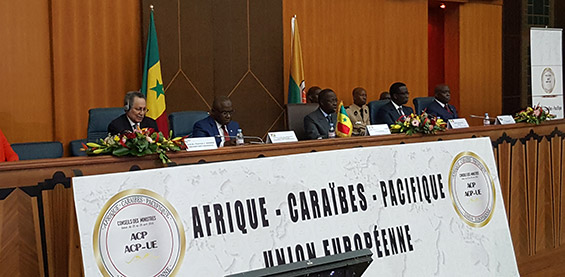Ministers discuss decisive year for ACP Group of 79 countries

Dakar, Senegal, 26 April, 2016/ ACP: A call to rally together behind key common issues and preserve solidarity when dealing with partners set the tone at the opening of the 103rd session of the Council of Ministers of the African, Caribbean and Pacific Group of States today.
The Council of Ministers will discuss several critical items before meeting with counterparts from the European Union on the 28th and 29th of April. This includes matters related to trade, development cooperation, and the future of the ACP Group, including its relations with the EU beyond 2020.
In opening the event, Senegal’s Prime Minister H.E. Mahammed Boun Abdallah Dionne detailed the complexities of challenges faced by ACP member states in the 21st century.
“Most of the ACP states continue to be affected by poverty, particularly in rural areas, due to endogenous factors, such as low levels of economic development [and] the lack of structural transformation of ACP economies, a lack of resources both human and technical, the degradation of their environment, but also the highly unequal characteristics of world trade,” said Prime Minister Dionne.
He added that after decades of cooperation, it is necessary to re-examine the ACP-EU Cotonou Partnership Agreement in an increasingly multipolar, interdependent and complex world, to ensure it brings maximum benefit to ACP countries in addressing poverty eradication and promoting sustainable economic development.
Pointing to the Economic Partnership Agreements (EPAs) between regional blocs and the European Union, Prime Minister Dionne encouraged fellow West African states to ratify the free trade agreement signed with the EU in 2014. At the same time, he highlighted the risk of compromising elements of the ACP-EU Cotonou Agreement, as well as the need to clarify how the fiscal effects resulting from trade liberalisation, such as loss of tariffs revenues, will be compensated.
He welcomed strategic discussions taking place to chart a more dynamic future for the ACP, urging stronger engagement with the private sector and more attention to issues related to migration.
“My hope is that this organisation, the Group of ACP States, continues to symbolise the solidarity and dynamic cooperation amongst our peoples,” said Prime Minister Dionne.
The ACP Secretary General H.E. Dr. Patrick Gomes called for high levels of engagement from ACP leaders at the upcoming 8th Summit of Heads of State and Government, to be held in Port Moresby, Papua New Guinea on 30 May to 1 June. The event is expected to provide political support for the strategic reorientation of the organisation, and a basis from which future relations with the European Union post-2020 can be addressed more concretely.
A key report by an Eminent Persons panel chaired by former President of Nigeria Chief Olusegun Obasanjo on the future of the Group will be considered at the Summit.
“2016 is significant because the process of reflection that began last year on ACP-EU relations after 2020, will gather momentum in the course of 2016, with broad outlines of the aspirations and expectations from each side becoming clearer,” stated Secretary General Gomes.
The ACP Group includes 79 member countries from Sub-Saharan Africa, the Caribbean and the Pacific. It was established in 1975 and has since signed on to successive agreements with the European Union covering trade, development cooperation and political dialogue. The most recent agreement was signed in 2000 in Cotonou, Benin for a period of 20 years. With the end of the agreement approaching in 2020, discussions have begun on how to shape a follow-up framework, given key global shifts and transformed international landscape. For the ACP, this includes the possibility of diversifying partnerships, reviewing strategic focus areas, and improving structures of the organisation.
– ACP Press
